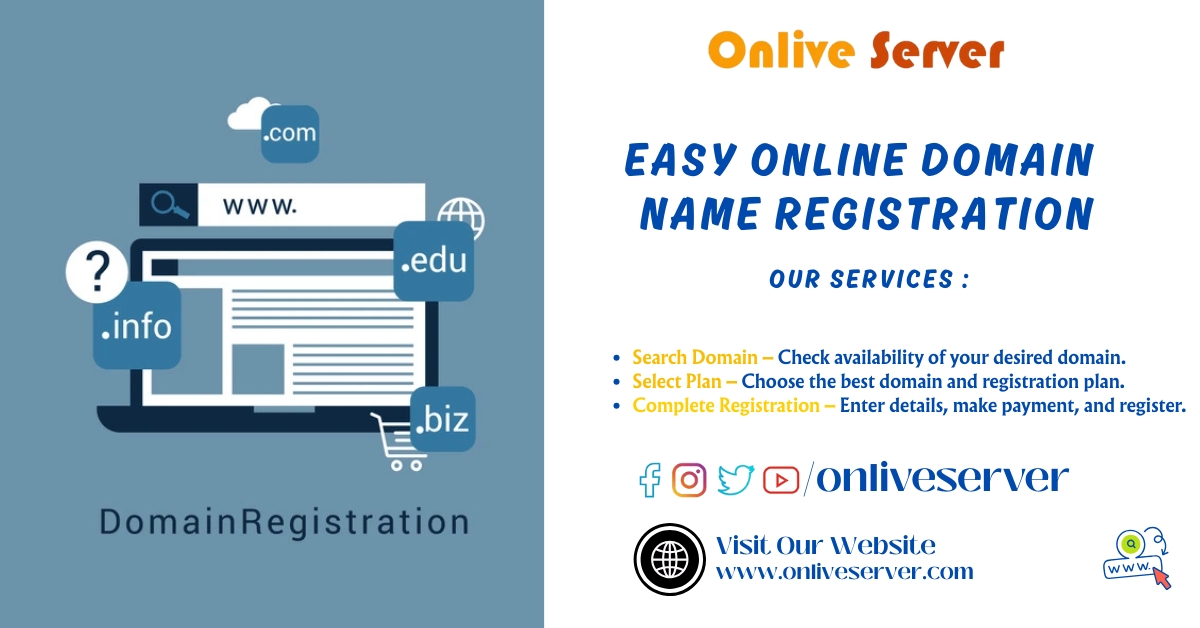
When starting a website, the first step is choosing a domain name representing your brand or business. Domain name registration reserves your online address, ensuring no one else can take it. This unique identifier helps establish your online presence and gives credibility to your website. Booking your Domain Name Registration online gives you control over your digital identity, allowing your website to be accessible to users across the globe. Without registering your domain, you risk losing it to someone else, which can significantly disrupt your business or personal project. In this blog, we’ll guide you through registering your domain, as well as the benefits and tips to ensure it’s done right.
Table of Contents
- Key Takeaways
- Benefits of Registering Your Domain Name Online
- Steps to Register a Domain Name Online
- Choosing the Right Domain Name for Your Website
- How to Choose the Best Domain Extension
- The Role of Privacy Protection in Domain Registration
- The Cost of Domain Name Registration: What You Need to Know
- Domain Name Management: Keeping Your Website Secure
- How to Register a Domain Name with Onlive Server
- Domain Registration Renewals: A Critical Step in Maintaining Your Online Presence
- Troubleshooting Common Domain Registration Issues
- Conclusion
- Frequently Asked Questions
Key Takeaways
- Registering a domain is essential in creating your online presence and ensuring that you own your digital identity.
- Choose a domain name that is short, memorable, and relevant to your brand or business.
- Consider privacy protection to safeguard your details and prevent unwanted solicitations.
- Keep track of your domain’s renewal dates to maintain uninterrupted access and avoid losing your domain.
Benefits of Registering Your Domain Name Online
Registering your domain name online offers several significant advantages for businesses, personal projects, and professional websites. First, domain name registration gives you ownership and control over your online identity, ensuring that no one else can use your name or brand for their purposes. This control is essential for maintaining a unique presence on the web. A custom domain adds credibility and professionalism to your website, making your business appear more trustworthy to visitors, which is crucial for building a solid online reputation.
A memorable domain name strengthens brand recognition, helping customers or visitors easily find and remember you. Furthermore, a well-chosen domain name can positively impact your website’s search engine optimization (SEO), making it easier for search engines to understand the nature of your site and boost its visibility. Overall, domain name registration is essential in establishing and growing your online presence.
Steps to Register a Domain Name Online
Registering a domain name is a straightforward process that can be completed in just a few steps. Here’s how:
- Search for Availability: Use a domain search tool to check if your preferred domain name is available. If it’s already taken, the tool will suggest alternatives.
- Choose a Domain Name: Pick a domain name that reflects your brand, is easy to spell, and is memorable.
- Select a Domain Extension: Choose the appropriate extension for your site (e.g., .com, .org, .net, or a country-specific extension like .co.uk).
- Fill in Your Information: Provide the necessary details for registration, such as your name, email, and address.
- Payment: Complete your registration payment. You will be billed annually, though many providers offer multiple-year discounts.
- Complete Registration: Once your payment is processed, you’ll receive confirmation and gain access to your domain.
Choosing the Right Domain Name for Your Website
Choosing the perfect domain name is crucial for your online success. To make the best choice, keep it short and straightforward. A shorter name is easier to remember, type, and share, so avoid long or complex names that could confuse visitors. Additionally, your domain name should be relevant to your website’s purpose, whether tied to your business, niche, or personal brand.
It’s also important to avoid using numbers and hyphens, as they can complicate your domain name and make it harder for users to find. Lastly, think long-term when selecting a domain name. It should be flexible enough for future growth and changes to your business or content. A well-chosen domain will continue to serve you as your online presence evolves.
How to Choose the Best Domain Extension
A domain extension, or top-level domain (TLD), is the suffix at the end of your domain name (e.g., .com, .net, .org). Choosing the right extension is essential for both branding and SEO. Here’s a breakdown:
- .com: The most popular and widely recognized TLD, ideal for businesses and personal websites.
- .net: Often used by technology companies or networks, it’s also suitable for general use if .com is unavailable.
- .org: This extension is typically used for nonprofits, educational institutions, or other organizations.
- Country-Specific Extensions: If you’re targeting a specific region, consider using country-code TLDs like .co.uk (for the UK) or .ca (for Canada).
- New TLDs: With the expansion of available TLDs, creative options like .store, .blog, or .tech have emerged that can highlight your niche.
The Role of Privacy Protection in Domain Registration
When registering a domain, your contact information is available to the public through the WHOIS database. Do you consider adding privacy protection to your domain registration to protect your privacy and reduce spam? This service hides your contact details, ensuring only authorized parties can access them.
Domain privacy protection adds an extra layer of security to your online identity, helping prevent identity theft, spam, and unsolicited offers. It’s a small investment that can save you from risks and ensure peace of mind.
The Cost of Domain Name Registration: What You Need to Know
The cost of registering a domain name can vary depending on the domain extension and the provider you choose. The average cost ranges from $11 to $58 per year for popular TLDs like .com, .net, or .org.
- Standard Registration: The typical price for a domain name is around $11-$50 per year.
- Premium Domains: Some domain names, especially short or highly desirable ones, may be more expensive, ranging from hundreds to thousands of dollars.
- Additional Costs: Other optional services like domain privacy protection or hosting may incur extra charges, but they are often worth the investment for added security and convenience.
Domain Name Management: Keeping Your Website Secure
Once you’ve registered your domain, it’s essential to manage it effectively to keep your online presence secure. Here are some key tasks to ensure your domain stays safe:
- Set Up Auto-Renewal: Enabling auto-renewal ensures that you don’t accidentally let your domain expire, which could result in losing ownership.
- Update Your Contact Information: Make sure your contact information is always up to date to receive important renewal notices and updates.
- Monitor Your Domain’s Status: Regularly check your domain’s status to ensure it’s active and secure and address any issues promptly.
How to Register a Domain Name with Onlive Server
Registering a domain with Onlive Server is a simple and efficient process. Here’s how:
- Search for Availability: Use Onlive Server’s domain search tool to find the perfect domain for your website.
- Select Your Domain and Extension: Choose the domain name and extension that best fits your needs and budget.
- Complete the Registration: Fill in your details and complete the payment process to register your domain officially.
- Access Your Domain: After registration, you’ll receive a confirmation email and gain access to manage your domain.
Domain Registration Renewals: A Critical Step in Maintaining Your Online Presence
Once you’ve registered your domain, staying on top of renewal dates is essential to avoid losing your domain to someone else. To make this easier, set reminders for renewal dates or, even better, enable auto-renewal to ensure your domain is renewed automatically. Some domain registrars offer a grace period after expiration, giving you more time to renew your domain without losing it.
To further secure your online presence, consider registering your domain for multiple years. This locks in your ownership and reduces the need for annual renewals, giving you peace of mind. Staying proactive with your Domain Name registration and renewal will help protect your online identity in the long run.
Troubleshooting Common Domain Registration Issues
Domain registration can sometimes come with issues. Here are a few common problems and how to resolve them:
- Domain Already Taken: If your desired domain is unavailable, consider using alternative TLDs or modifying the name slightly to make it unique.
- Payment Issues: Ensure your payment details are correct and up-to-date to avoid delays or errors during registration.
- WHOIS Information Errors: Ensure all your contact information is accurate and updated to avoid missing essential renewal notices.
Conclusion
Registering a domain name is a crucial step in establishing your online presence. It provides you with control, credibility, and branding opportunities. Following the simple steps in this guide, you can easily secure your domain and protect your information with privacy features. Managing your domain effectively ensures your website remains secure and accessible, allowing you to maintain a strong online presence. Whether you’re launching a business, blog, or e-commerce site, a well-registered domain is the foundation for online success.
